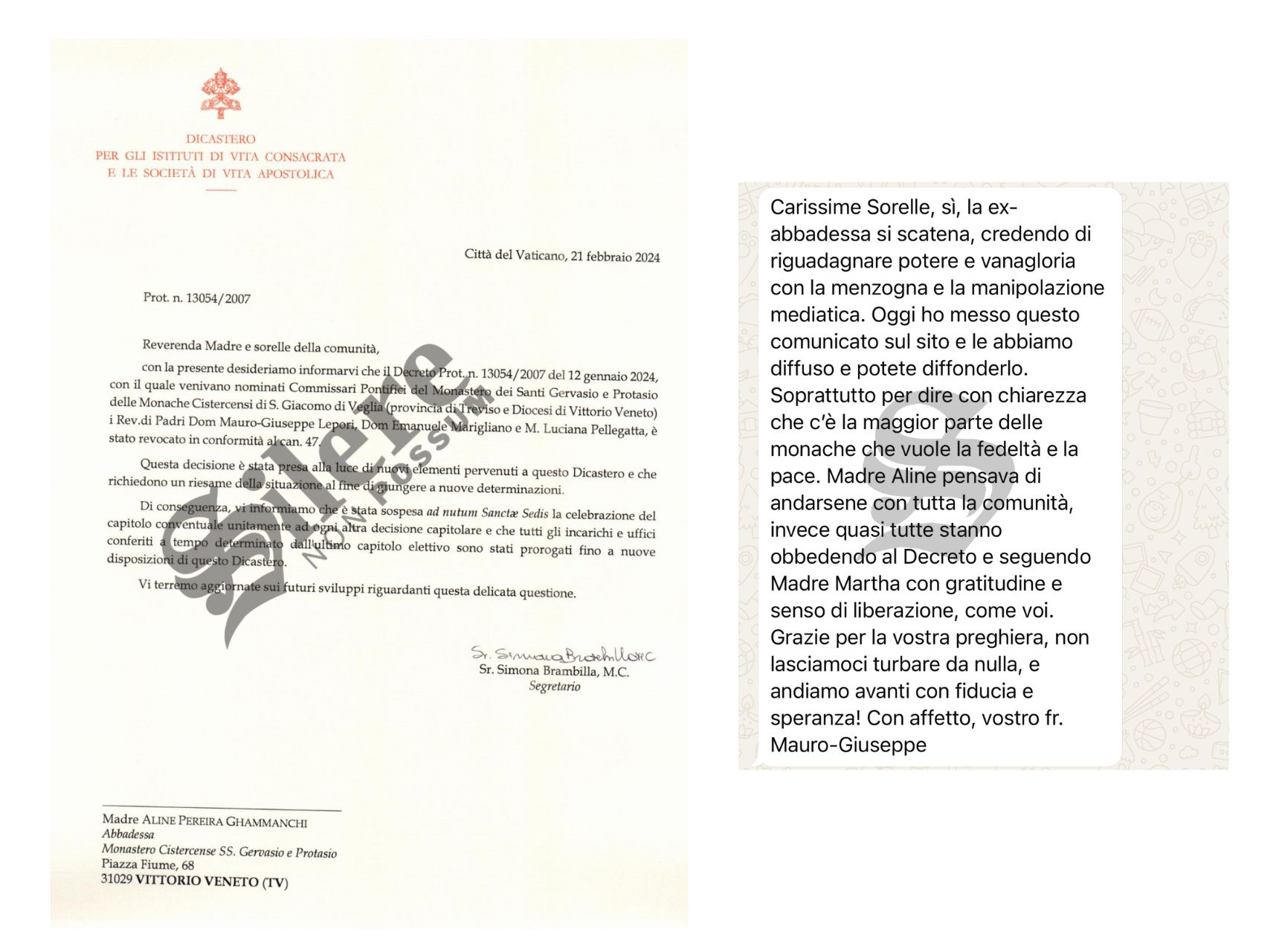Catch up on previous chapters of the survey
🇮🇹 Versione italiana
Vatican City – The visit of Mother Ester Stucchi to the monastic community of San Giacomo di Veglia began on 4 February 2023. From the outset, the visitor informed the religious sisters that a letter of complaint had been sent to the Holy Father. She then briefly outlined the accusations contained in the document, which were primarily directed at the abbess, Sister Aline Pereira Ghammachi.
The revelation caused great consternation among the nuns: of the twenty women in the community, only four had been involved in drafting and sending the letter, while the remaining sixteen were entirely unaware of its existence. As already highlighted in our previous article, most of the sisters are vulnerable individuals, struggling with psychological challenges, which makes the exploitation they suffered even more disturbing. It appears that a vengeful individual, previously expelled from the monastery by the Abbess due to his leadership of pseudo-mystical groups, instrumentalised the nuns in an effort to attack her.
A Medicinal Penalty: Repairing the Harm
Following the visit and upon understanding the content of the complaint, the Mother Abbess considered it necessary to consult a canon lawyer to explore possible disciplinary measures against the sisters involved, who had gravely damaged her reputation and that of the community. It is essential to stress that these nuns had already expressed their intention to leave the monastery—an almost inevitable outcome given the deteriorated climate that had emerged. According to ecclesiastical discipline, repentance, penance, and reparation of the harm done are required.
However, the canonist recommended to the abbess turned out to be utterly unsuitable—not only lacking the necessary competence, but also notorious for causing disorder in other dioceses and religious institutions. His document was riddled with grave spelling errors and was fundamentally flawed in both form and substance: it cited incorrect canon laws, confused institutional roles (referring to a “President of the Federation” instead of Abbesses), and omitted elements essential for the legal validity of the decree.
A serious professional in such a context should have advised the Abbess that any punitive measure ought to be issued only after a proper canonical trial, conducted by an impartial third party, in order to avoid abuse of authority. As some officials at the Dicastery remark with bitter irony, “certain frustrated young men couldn’t afford to live in expensive cities if they weren’t fleecing the inexperienced.” A harsh comment, but one that aptly captures the atmosphere and the characters involved. Despite its deficiencies, the document was signed by the Abbess and two sisters were ordered to undergo a year of exclusion from the monastery. While the substance of the decision may have been justified—given that the sisters had misled the Holy Father and the Dicastery for Institutes of Consecrated Life and Societies of Apostolic Life, causing serious harm to their own community—the accusations they made were baseless and proven false by the facts.
The real issue, however, lay not in the content, but in the procedure. Someone who publicly boasts of his expertise in canon law and travels Italy presenting himself as a specialist should have known better—and should have given correct advice to those who entrusted him with their case. Moreover, Canon 1733 §1 of the Code of Canon Law clearly states that: “It is highly desirable that, whenever someone believes himself burdened by a decree, no conflict should arise between him and the author of the decree, but that they strive together to reach an equitable solution, possibly with the help of competent mediators.” The nuns, faced with a flawed decree, should have followed Canon 1734 §1 by presenting an initial appeal to the Abbess and, if necessary, to the hierarchical superior.

Abuse of Authority and Amoral Familism
But this did not occur. Instead of following the canonical process, the sisters opted for an informal route, directly approaching the Abbot General of the Order, Mauro Giuseppe Lepori. He took matters into his own hands, personally visiting the Secretary of the Dicastery for Institutes of Consecrated Life, requesting not only the annulment of the decree—thus also dismissing allegations of abuse of authority—but also that he himself be appointed to carry out an Extraordinary Visitation. On 8 March 2023, the Dicastery signed a letter addressed to Dom Mauro Giuseppe Lepori, inviting him to conduct an extraordinary visitation to the Monastery of Saints Gervasius and Protasius. According to the Constitutions of the Cistercian Order, the Abbot General may “visit, in cases of grave necessity or difficult situations, a monastery of a Congregation, with the consent of his Council and after informing the Abbot President of the Congregation.” On 31 March 2023, Lepori wrote to the community to inform them that he had received the mandate: “As prescribed, I discussed the matter with my Council, which met in Rome in mid-March. The Council unanimously accepted the mandate of the Holy See, and we decided to involve as co-visitor the President Abbess of the Castile Congregation, Mother Kandida Saratxaga of Lazkao.” Notably, she was part of Lepori’s Council until 2022—in essence, a close friend.
Yet Lepori refers to the “Council” as if it had granted the mandate. How could it have refused? In fact, Lepori had requested the appointment himself, then returned to the Council with the mandate already secured. “How could we say no to the Holy See?” a Council member asked. Here, one perceives the modus operandi of Mauro Giuseppe Lepori, who violates canon law yet then punishes monks or nuns who act similarly—but in good faith, unlike him.
Moreover, Lepori excluded Dom Stefano Zanolini, President Abbot of the Congregation of San Bernardo in Italy, who according to the Constitutions should have been consulted and included. Why was he left out? Because Zanolini had already visited the monastery, endorsing Mother Ester Stucchi’s assessment, which found the accusations against Abbess Ghammachi to be false and slanderous. Lepori's decision thus appears driven by personal bias against the Abbess, whom he allegedly described as “too beautiful and too young to be an Abbess.” Within the General House on the Aventine in Rome, monks have spoken of a friendship between Sister Ghammachi and Abbot Lepori, which had defined their years of collaboration. This personal involvement, however, should have prompted the Abbot General to recuse himself, allowing for an impartial party to intervene.
Yet Another Economic Visitation
Despite urging the sisters during interviews to forgive the four slanderers and admitting that the decrees issued were contrary to canon law, at the conclusion of the visitation, neither irregularities were noted nor concrete actions taken. No written report of the visitation was ever shared with the community. The only official act was a letter dated 23 May 2023 addressed to Bishop Corrado Pizziolo of Vittorio Veneto, requesting an economic audit within the scope of the extraordinary visitation, and asking him to appoint a trusted auditor.
The involvement of the diocesan bishop and the parish abbot of Oderzo, appointed co-visitor, aligns with a clear strategy by Lepori: to isolate the Monastery and undermine its reputation, despite its longstanding esteem in the region—even among prominent political figures. It is important to note that a diocesan bishop has no jurisdiction over a sui iuris monastery belonging to an order with a major superior, as stated in Canon 615 CJC.
Bishop Pizziolo responded by appointing Mr Alessandro Testa, diocesan treasurer since 2021, to conduct the audit. Between July and October 2023, Testa carefully examined the documents and concluded that no financial irregularities existed.

Apostolic Intervention – But to What End?
On 12 January 2024, the Dicastery for Institutes of Consecrated Life and Societies of Apostolic Life appointed Pontifical Commissioners for the Monastery of Saints Gervasius and Protasius of the Cistercian Nuns of San Giacomo di Veglia (Treviso Province, Diocese of Vittorio Veneto): Dom Mauro-Giuseppe Lepori, Dom Emanuele Marigliano, and M. Luciana Pellegatta.
The decree arrived without explanation or justification, and Lepori’s appointment was clearly unlawful, due to a blatant conflict of interest as he is also the Major Superior of the Cistercian Order. Yet this controversial practice is now entrenched in the Dicastery, as Lepori has had himself appointed in the cases of Zirc Monastery (Hungary), Santa Susanna (Rome), and Bornem Monastery (Belgium).
However, the decree was never formally communicated to the community: the Abbess only learned of it informally. Silere non possum managed to obtain and examine the document. An internal source from the Dicastery revealed: “The Abbess came here requesting explanations. While we were clarifying matters, she showed Sister Simona Brambilla emails from Father Lepori, clearly indicating his intent to control and centralise the situation. In one message, he acknowledged that she had learned of the decree but claimed that only he could properly explain the decisions taken.” These emails, now filed with the Dicastery, show behaviour strikingly similar to what Father Dysmas De Lassus described in his book “Abuses in the Religious Life and the Path to Healing”, concerning spiritual abuse in religious life. Moreover, Lepori informed the community of his visit only two days in advance, coinciding with a medical appointment the Abbess was due to attend. When informed that the notice was insufficient and the community unprepared, Lepori reacted angrily, writing: “The bishop told me you’ve known about this for a week.” However, no official document mentioned a specific arrival date. Once again, the same coercive pattern emerges: “If you don’t receive me, you disobey the Holy Father,” “I act on behalf of the Pope; you must obey,” “You’re worsening your situation and leading the community into a dead end.”
These messages, immediately forwarded to the Dicastery, prompted a rare and decisive response. “We called Lepori and told him not to show up on 10 January and to await further instructions. Shortly after, we signed a new decree revoking the previous one,” they confirmed at Piazza Pio XII. Lepori’s abusive and resentful behaviour was further confirmed by a WhatsApp message he recently sent to a group of nuns, where he made defamatory remarks about Mother Aline Pereira Ghammachi, demonstrating a complete lack of objectivity and personal detachment.
But sadly, the story does not end here…
p.M.A.
Silere non possum